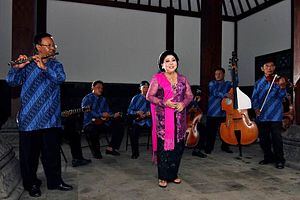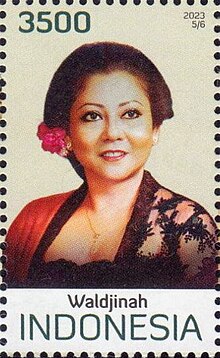
Waldjinah (born 7 November 1945) is an Indonesian traditional singer. She is most known for the song "Walang Kekek", which made Javanese keroncong music known throughout Indonesia. She has also worked with other Indonesian artists, including Gesang Martohartono and Ismail Marzuki.
Early life and career
Waldjinah was born in Surakarta, Indonesia, on 7 November 1945 as the tenth child of her family. Her mother sold food in a market and her father worked as a painter in a batik factory. Waldjinah was inspired to become a singer from listening to traditional Javanese songs at the factory where her father worked. During her high school years, she became interested in keroncong music.
In 1958, Waldjinah entered a singing competition held by the Radio Republik Indonesia radio station in Surakarta. After winning the competition, her professional career began and she became a celebrity. In 1960, she was voted the singer with most potential at a national competition in Jakarta.
Waldjinah has recorded 200 albums and over 1500 songs. She is known for the hit song "Walang Kekek", which made Javanese keroncong music known throughout Indonesia. She has worked with other Indonesian artists, including Gesang Martohartono, Mus Mulyadi, Andjar Any, and Ismail Marzuki.
Personal life

Waldjinah's first husband managed her own career as well as her backing band, Orkes Keroncong Bintang Surakarta. He died in 1985. She met her second husband four years later, who also worked as her manager. She has five children, as well as eight grandchildren and three great-grandchildren. Her son Ary Mulyono, an accomplished instrumentalist who also with keroncong, is leader of her backing band.
Waldjinah owns the Galeri Walang Kekek, an art gallery located in Grogol, Sukoharjo which exhibits her collection of batik cloth.
Discography
| This section of a biography of a living person needs additional citations for verification. Please help by adding reliable sources. Contentious material about living persons that is unsourced or poorly sourced must be removed immediately from the article and its talk page, especially if potentially libelous. Find sources: "Waldjinah" – news · newspapers · books · scholar · JSTOR (December 2019) (Learn how and when to remove this message) |
- Ratu Kembang Katjang (1967, Lokananta)
- Putri Solo Vol. 1 (1967, Elshinta)
- Putri Gunung Vol. 2 (1968, Elshinta)
- Ngelam-Lami (1968, Lokananta)
- Walang Kekek (1968, Elshinta)
- Langgam Jawa Terpopuler (1983, Fajar)
- Langgam Jawa (1993, Nirwana)
- Ratu Jawa (2004, Rice)
References
- Mukti, Akbar Hari (4 December 2017). "INI Kabar Terbaru dari Waldjinah Ratu Keroncong Indonesia". Tribun Jateng (in Indonesian). Retrieved 10 December 2019.
- ^ "Waldjinah". Gamelan Padhang Moncar. New Zealand. Archived from the original on 26 January 2015.
- ^ Juniman, Puput Tripeni (31 March 2018). "Waldjinah, dari Ratu Kembang Katjang ke Ratu Keroncong". CNN Indonesia (in Indonesian). Retrieved 10 December 2019.
- ^ Skelchy, Russell P. (July 2017). Weintraub, Andrew N.; Barendregt, Bart (eds.). Vamping the Stage: Female Voices of Asian Modernities. Honolulu: University of Hawai'i Press. pp. 293–298. ISBN 9780824869861.
- Rey, Larasati (11 September 2019). "Ketemu Maestro Keroncong Waldjinah, Ini Celetukan Ganjar Pranowo". IDN Times (in Indonesian). Retrieved 10 December 2019.